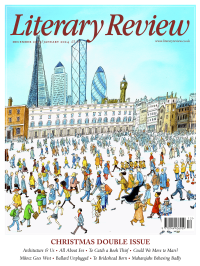Bernard Porter
State of Emergency
Trapped in History: Kenya, Mau Mau and Me
By Nicholas Rankin
Faber & Faber 560pp £25
The colonisation of Kenya is generally acknowledged to represent the worst of all the criminal enterprises that helped form the British Empire in the 19th and 20th centuries. In the 1950s, the colony underwent an ‘Emergency’ – others would call it a war – so bloody that afterwards the British government sought to spirit away most of the official documentation on it to a highly secret archive in Buckinghamshire (in the 2010s it was eventually opened up as a result of a court case pursued by some of the conflict’s African victims). The government of the day and the general public, informed by the tabloid press, attributed the whole affair to the innate barbarism of an African organisation known as the Mau Mau, whose atrocities both shocked and thrilled readers brought up on popular imperialist novels and films. Those atrocities were genuine. The Mau Mau administered dark ‘oaths’ reinforced by bloody rituals, and slaughtered – often ghoulishly – men, women and children, both white and native (the latter if they were seen as ‘collaborators’ or simply because they refused to take the oaths). White settlers lived in terror of these monsters, who at any moment could emerge from the forests, dressed in animal skins and wielding huge knives, to slay them in their beds (apparently the Mau Mau could smell their victims out from two miles away). ‘Only’ twenty-odd settlers were murdered in this way, as against thousands of Africans shot and hanged in reprisal, but the fear was real. It was exacerbated when the Mau Mau came under suspicion – as most protest movements did in that paranoid age – of being Soviet backed.
An alternative way of regarding the rise of the Mau Mau was as an extreme and deplorable but nonetheless understandable ‘nationalist’ response to the crimes of the white colonists, first of all in stealing the best lands from the Africans, and then in subjecting them to appallingly racist treatment as

Sign Up to our newsletter
Receive free articles, highlights from the archive, news, details of prizes, and much more.@Lit_Review
Follow Literary Review on Twitter
Twitter Feed
Under its longest-serving editor, Graydon Carter, Vanity Fair was that rare thing – a New York society magazine that published serious journalism.
@PeterPeteryork looks at what Carter got right.
Peter York - Deluxe Editions
Peter York: Deluxe Editions - When the Going Was Good: An Editor’s Adventures During the Last Golden Age of Magazines by Graydon Carter
literaryreview.co.uk
Henry James returned to America in 1904 with three objectives: to see his brother William, to deliver a series of lectures on Balzac, and to gather material for a pair of books about modern America.
Peter Rose follows James out west.
Peter Rose - The Restless Analyst
Peter Rose: The Restless Analyst - Henry James Comes Home: Rediscovering America in the Gilded Age by Peter Brooks...
literaryreview.co.uk
Vladimir Putin served his apprenticeship in the KGB toward the end of the Cold War, a period during which Western societies were infiltrated by so-called 'illegals'.
Piers Brendon examines how the culture of Soviet spycraft shaped his thinking.
Piers Brendon - Tinker, Tailor, Sleeper, Troll
Piers Brendon: Tinker, Tailor, Sleeper, Troll - The Illegals: Russia’s Most Audacious Spies and the Plot to Infiltrate the West by Shaun Walker
literaryreview.co.uk